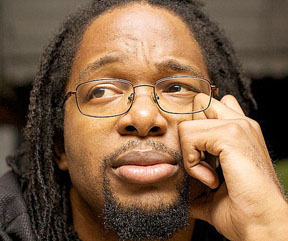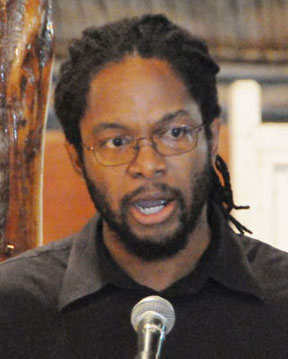To hear him tell it, it could seem that Kojo McPherson’s journey to prominence as a writer, film producer, poet and photographer might have been incidental. But the man’s talent tells the real story; that it must have been preordained and his artistic self was just waiting in the wings while he nattered with science and technology.
The youngest of four children and the only boy, Kojo reckons he turned out okay given that his childhood was dominated by his three sisters towering over him. “It turned out okay but when you are the youngest and only boy you can get taken advantage of,” he says. Today he shares interesting individual relationships with each sister, since they all played motherly roles in his life, mentoring him along the way.
that his childhood was dominated by his three sisters towering over him. “It turned out okay but when you are the youngest and only boy you can get taken advantage of,” he says. Today he shares interesting individual relationships with each sister, since they all played motherly roles in his life, mentoring him along the way.
Kojo migrated with his family to the United States at the age of three and lived in the small nested community of Ithaca in upstate New York up until the age of 12. When he returned to Guyana he lived around Georgetown for a while and now resides in Kitty for nearly a decade.
He describes himself as “nerdy”; as a child he always loved to read. “I would go off into different places,” he says. Fantasy novels were his absolute favourites, from The Hobbit to Lord of the Rings. He is currently reading Game of Thrones, the first book of a series of high fantasy novels by American author, George R R Martin.
While a student at President’s College, he was in the technology stream, since he possessed a love for science and machinery. He never saw arts as something he would get into, though he had a love for theatre. This saw him take it up as a hobby while in Sixth Form at the Bishops’ High School.
He then pursued a Degree in International Relations at the University of Guyana, but took a leave of absence in his third year of studies. The reasons were complex; while there was the usual turmoil and fiascos that still mar UG today; Kojo was doing some amount of personal reflection on his future and what he really wanted to do in life.
At this time he found himself writing a lot of poetry and even co-founded a short-lived youth group, promoting writers in Guyana and encouraging each other’s work. Because he was always involved some way or the other in the arts, Kojo eventually ended up in a workshop that was the precursor to the radio serial drama “Merundoi”. Writing for “Merundoi” proved to be the launch pad for his current career.
“Many, many, many years later and here I am now, where I wasn’t supposed to be and now I am very proud of the way I ended up doing this for a living,” he says.
Though poetry was his great love before going to “Merundoi”, once there, he found himself writing less poetry and immersing himself in photography and film. When “Merundoi’s” future looked uncertain owing to a decrease in funding, Kojo, having serving on the production team for four and a half years and as a senior script writer for the later years, took up photography as a side step.
“I don’t even feel as if I’m giving up one art form for another, to me it’s about sampling different dishes to make one big meal,” he says. “For me as a film maker, I can draw on my experience as a writer, as a performing artist, as a director selecting my shots, doing my storyboards; I draw on my experiences as a photographer – all these different threads get moving together.”
 He prefers filmmaking and directing because he feels most comfortable knowing that it is a collaborative form and unites all his artistic endeavours. As he describes it, “All the arts pulled together and sewn into a masterpiece.”
He prefers filmmaking and directing because he feels most comfortable knowing that it is a collaborative form and unites all his artistic endeavours. As he describes it, “All the arts pulled together and sewn into a masterpiece.”
Some of his notable work includes such poems as “The Revolution Will Not Be Televised”, which is an adaptation of the poem and song of the same name by American jazz and soul poet, Gil Scott-Heron and “A Poem for Kinaya”, which is dedicated to his daughter. This poem centres on emotional times and struggles before finally the success of seeing a beautiful baby girl.
Kojo recalls that his sister used to take him to the movies a lot as a child and there he got an introduction to foreign films. Those experiences gave him greater appreciation for visual arts.
His first taste of film production came when he was a volunteer with UNICEF in 2004/5. In a workshop hosted in Suriname, Kojo was assigned to make a one-minute film on human issues. Although he considered the film to be a disaster, it was one of the things that steered him towards where he is now.
Kojo has written, directed and edited the short film Beached, which was his first film done outside the work of UNICEF. He describes it as a good narrative on a man losing his family before spiralling into depression which led him to attempt suicide. He is saved by ‘divine intervention’ and is able to find peace. Kojo says the film was very “close to home” for him since it helped get a lot of burdens off his shoulders.
He is currently working on a short film titled Standing, which promises to take a deep look into the social and political environment of Guyana.
Political activism is a major influence in Kojo’s work. Not one to stay quiet, he is constantly expressing the daily realities through words and photography. “A lot of the poetry I write has been along the line of politics and society and I try to cover every aspect of life through everyone’s eyes,” he says.
He started photography as a hobby and later invested in it by buying lens, flashes and pieces of equipment before making it a job.
As a volunteer photographer for the Alliance for Chance political party, he found himself covering everything from bottom house meetings to the political and civil unrest in Linden. “Photography helps me to see other people; see the hearts of people; see pain in its raw form, and see their hopes and energy and compassion. That is my photojournalistic style of photography, capturing them as they are with no edits,” he says.
Kojo is inspired by film greats such as Steven Spielberg and JJ Abrams, who, like him, were college drop-outs, but had the passion and the talent that led to successful careers.
Another motivational figure in his life is his mother who offers him emotional and spiritual support. “She has tremendous faith in the power above and being consistent in working on something. She is always there for me… throughout my existence,” he says.
He sees himself owning his own production company in the future along with award winning playwright, Mosa Telford and other interested parties. The aim of such a company would be to have a collection of past productions and to make films. He is cognisant of what it would take to start such a project.






